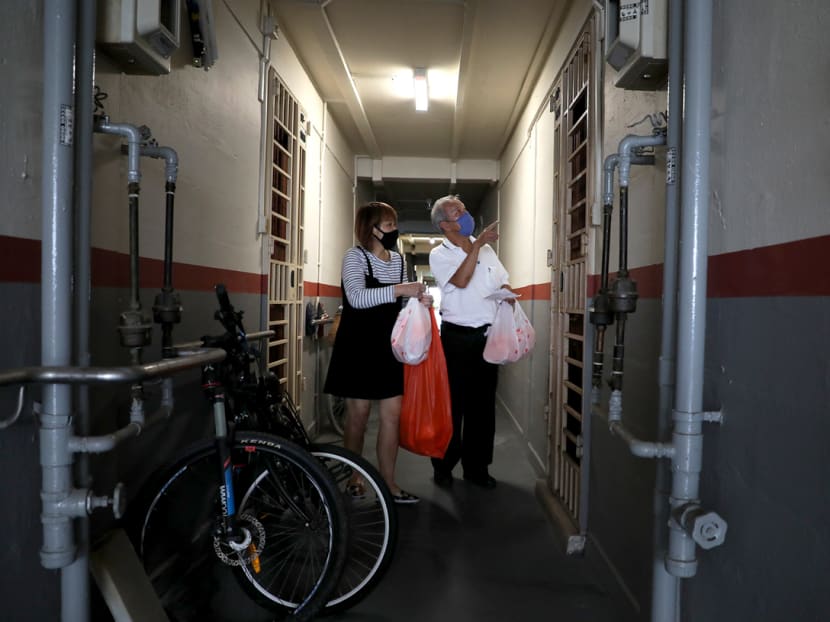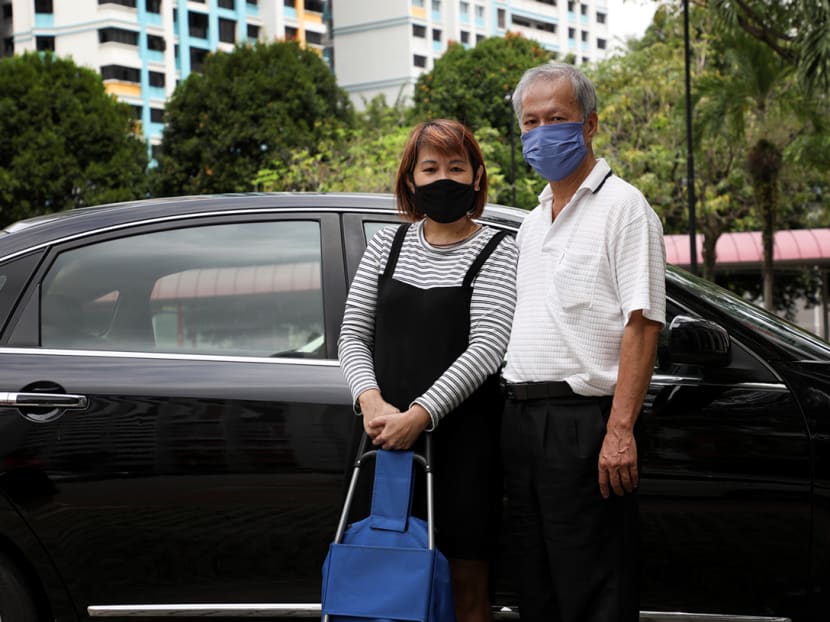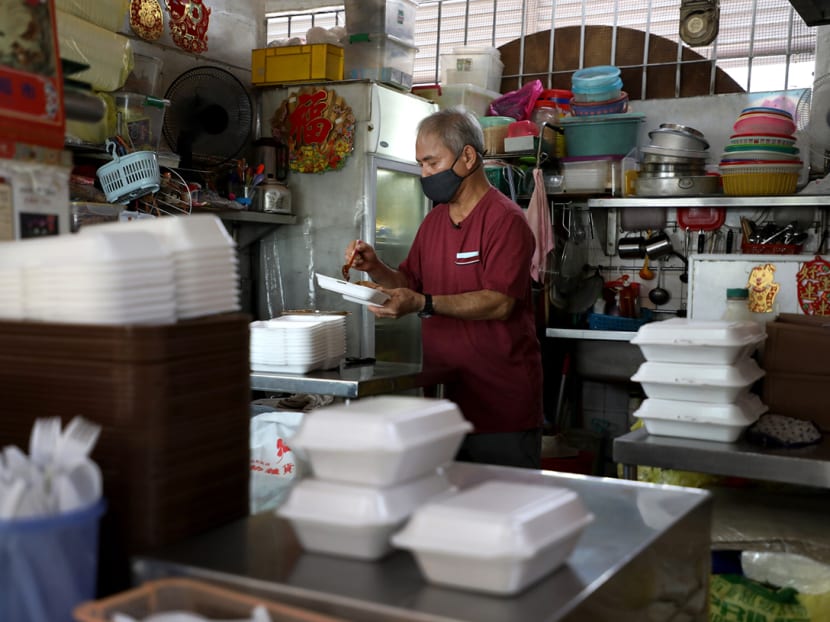Charities give workers and hawkers affected by circuit breaker a leg up with food delivery for the needy
SINGAPORE — Taxi driver Donny Ng, 63, has seen his income drop by almost three quarters during the Covid-19 pandemic and the circuit breaker.

Mr Donny Ng, 63, a taxi driver, and his wife Foo Powl Lian, 57, distribute packed lunches to seniors living in one-room rental flats in Ang Mo Kio on Wednesday (May 6) as part of YMCA's Wok the Talk initiative to provide hawker meals and grocery packs to vulnerable groups during the Covid-19 pandemic.
SINGAPORE — Taxi driver Donny Ng, 63, has seen his income drop by almost three quarters during the Covid-19 pandemic and the circuit breaker.
While he used to pick up more than 10 fares daily, he now only manages to get three or four on a good day.
His wife, Mdm Foo Powl Lian, 57, is unable to continue working as a hairdresser after enhanced measures announced on April 21 meant barber and hairdressing shops had to close temporarily.
With her husband at work, Mdm Foo said she felt bored and purposeless being alone at home.
But starting three weeks ago, the couple now spends about four hours a day on weekdays, delivering free hawker meals in Mr Ng’s taxi to the needy and vulnerable.
In return, Mr Ng receives around S$50 a day from the Young Men’s Christian Association (YMCA) of Singapore.
Mr Ng told TODAY that although the money is not nearly enough to make up for the income he and his wife lost during the circuit breaker, he was more than willing to do the work.
“I feel very happy that we can earn a bit of extra money, but also can help old folks, children and those who cannot work,” he said in Mandarin.
The pair are not the only ones trying their hand at deliveries under YMCA’s Wok the Talk initiative as well as a similar programme by food charity The Food Bank Singapore that provides meals for the needy and vulnerable, while supporting embattled hawkers.
Since April 19, YMCA’s initiative has engaged some 20 hawkers and five drivers to cook and deliver over 11,000 meals to 700 seniors, migrant workers and persons with special needs. Each meal costs around S$5.

Mr Steve Loh, YMCA of Singapore’s general secretary and chief executive officer, told TODAY that Wok the Talk is funded by donations it has garnered through Giving.sg, a third-party donation platform.
So far, it has raised S$35,000 out of a target of S$360,000, which Mr Loh says will help YMCA expand the initiative to reach more hawkers, drivers and beneficiaries.
He acknowledged that the S$50 a day paid to drivers was unlikely to help them recover their incomes, but he praised them for “going above and beyond the call”, especially those delivering food to migrant workers.
“As we know, people are afraid to deliver to the migrant worker dormitories,” he said.
“It’s not just a business transaction for them (the drivers). It’s a commitment as well.”
Migrant workers living in dormitories form the majority of confirmed Covid-19 cases in Singapore.
.embed-container { position: relative; padding-bottom: 56.25%; height: 0; overflow: hidden; max-width: 100%; } .embed-container iframe, .embed-container object, .embed-container embed { position: absolute; top: 0; left: 0; width: 100%; height: 100%; }Meanwhile, The Food Bank Singapore launched a similar meal programme on Monday (May 4) as an extension of its Feed the City initiative, which provides 10,000 meals every day to those in need by purchasing food from caterers and restaurants.
Ms Nichol Ng, co-founder of The Food Bank Singapore, told TODAY that this was the first time the food charity has worked with hawkers.
It started off with 200 packets of hawker food a day, with an eventual daily target of 500 packets at S$3 per meal.
So far, it has engaged around 30 hawkers and hired four workers, who have lost their incomes due to the pandemic, to do the deliveries.
The programme’s beneficiaries include frontline healthcare workers and needy families.
Ms Ng said: “One week into the circuit breaker period, we got some wind that hawkers had seen business dropping by 80 per cent or more… most of the run of-the-mill hawkers have been quite badly affected.”
She also said that the initiative’s current focus is on hawker centres near the Chinatown area, such as Maxwell Food Centre and Amoy Street Food Centre, as hawkers working there are among those hit the hardest by the pandemic.
“The Chinatown precinct is also very close to many of the one-room flats in the rented areas, so we are able to link up hawkers with the beneficiaries fairly easily,” she said.
The hawker project is a partnership with Temasek Foundation, which provided funding for a two-week pilot.
However, Ms Ng said that The Food Bank Singapore is committed to providing business to the hawkers near Chinatown for at least one month.
It also pays S$50 a day to the delivery drivers for this initiative.
One such driver is Mr Daniel Chan, 36, a retail sales associate who has been out of work for the past few weeks after his workplace on Orchard Road shut due to circuit breaker measures.
He drives around 30 minutes every day to deliver food to two locations, which can include places such as public housing flats or Singapore General Hospital.
“It’s enough for me as a part-time job, for some petrol money and daily essentials,” he said, adding that he felt proud helping frontline healthcare workers and looks forward to making the deliveries every day.
Mdm Foo, who delivers food with her husband under Wok the Talk, echoed similar sentiments.
“Money is not the most important thing. In these times, it is more important to help people who need it most,” she told TODAY in Mandarin.
Mr Tan Ah Puay, 65, a hawker selling fried bee hoon at Ang Mo Kio Industrial Park, said he was grateful for the support provided to him by Wok the Talk, as many of the factory workers he relied on for business had stopped patronising his stall.
“Sometimes I will cook a lot, and then nobody comes, so I have to throw it all away,” he said, adding that the income from Wok the Talk helps him to keep his business afloat.

While he used to sell 40 packets a day, he now makes do with 10 at most. On Wednesday morning, his first day participating in Wok the Talk, he prepared over 20 packets of food that were delivered to beneficiaries by Mr Ng and Mdm Foo.
But like the couple and Mr Chan, Mr Tan is less concerned about his own financial gains.
He said: “I am happy as long as I have something to do. Now I can do something for charity, to do good… I will try my best. If I can help, I will help.”









